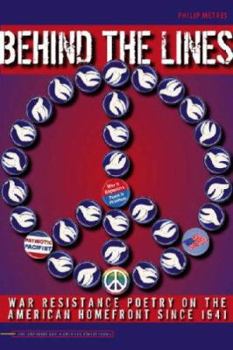Behind the Lines: War Resistance Poetry on the American Home Front Since 1941
Whether Thersites in Homer's Iliad, Wilfred Owen in "Dulce et Decorum Est," or Allen Ginsberg in "Wichita Vortex Sutra," poets have long given solitary voice against the brutality of war. The hasty cancellation of the 2003 White House symposium "Poetry and the American Voice" in the face of protests by Sam Hamill and other invited guests against the coming "shock and awe" campaign in Iraq reminded us that poetry and poets still have the power to challenge...
Format:Hardcover
Language:English
ISBN:0877459983
ISBN13:9780877459989
Release Date:May 2007
Publisher:University of Iowa Press
Length:282 Pages
Weight:1.20 lbs.
Dimensions:0.9" x 6.5" x 9.3"
Customer Reviews
2 ratings
Poetry AND history
Published by Thriftbooks.com User , 16 years ago
I liked the last review here from the Feminist Review blog because it gave me a different perspective on this book. However, I felt Behind the Lines was a much easier read than most poetry-related books nowadays. I would say it's harder to read than a Mystery novel or something like that but, in contrast to its last reviewer, I was pleasantly surprised at how much fun I had reading it. Behind the Lines is a book of literary criticism, meaning it discusses certain poems in depth and helps the reader understand them. Like the last reviewer, I didn't realize this at first. We both must have thought Behind the Lines was an anthology of war poetry from the title. Fortunately, there's no disappointment because not only does the author list every war (or "war resistance") poetry anthology that came out over nearly the last century but, he also dives much deeper into war resistance poems than any anthology would be able to. It was academic, but only in ways that I feel are really important, like in the way the author tried to never show bias towards one side of an argument or another and instead just let the reader think for herself. It did have some words I didn't know in it, but not enough to make it hard to read (and I like learning new words anyways). As far as literary criticism goes, this is one of the most readable books I've ever bought (it was one of the few literary criticism books I was actually able to finish!). Obviously, the best thing about this book is the poetry and the in depth explanations that help a reader understand it. However, a really cool thing I didn't expect was how many historical facts I learned from this book. Not your typical classroom stuff--we're talking about things the history books may very well hide on purpose. Until I read this book, I had no idea that there were any people that protested World War II, let alone the large amount it turns out to be. Also, I learned from this book that the image I had in my head of Vietnam veterans coming home and being spat upon is actually incorrect and there, believe it or not, are no actual accounts of any Vietnam vets being spat on. This blew me away. Whether it was about the poet Robert Lowell rejecting an invitation to the White House or a bunch of veterans throwing their metals of honor over the fences at congress in protest, this book taught me about poetry and gave me history lessons I probably couldn't have gotten anywhere else. Behind the Lines was not only my favorite book that I read this year, but I also ended up liking it more than a lot of the poetry I read. Do yourself a favor and check it out.
academic poetics
Published by Thriftbooks.com User , 17 years ago
This is not an easy read; it is a book that uses phrases like "intertextual passage." In other words, it is book that will help the writer get tenure. That is not to say it is not well written. Philip Metres has some sentences that sing, especially considering the academic style that he is required to use. The problem is that Behind the Lines is simply not written for the average reader. And since I finished my master's degree last year, I have quickly reverted back to being an average reader. I was attracted to this book by the title, as a person who enjoys reading poetry. I wanted to learn more about poetry in America, particularly war poetry since we are in the middle (or is the end?) of a war in Iraq, yet this book was more than I was counting on. There wasn't a lot of poetry inside it. Metres traces the history of war poetry and cites the works of poets from Robert Lowell and William Stafford to June Jordan and online group Poets Against the War, but you don't get to experience the poems as poems because they are excerpted and then scrutinized. If you want to learn about the limits of current lyric and autobiographical in the contemporary peace movement, this may be a book you want to read, but, personally, I have trouble even getting that sentence out. It brings back memories of being a graduate student, reading on Saturday nights in my pajamas and eating frozen dinners, and that's a place I'd rather not go back to.






